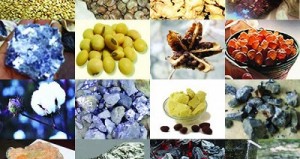How Nigeria Can Stimulate Non Oil Export

The dominance of oil as a major source of revenue is changing in many nations around the world. Most oil rich nations are diversifying their economy and Nigeria should do the same in order to increase her capital investment, promote value addition to key agricultural products and create jobs for the teeming youths.
It has been proven that a rise in export stimulates an increase aggregate economic growth and development. Increased export especially for the non-oil sector also creates employment, raises income and mitigates rural urban migration.
Nigeria is a nation endowed with vast natural resources which could be gainfully harnessed to explore the nation’s potentials for the export of agriculture and solid minerals yet Nigeria’s export is dominated by crude oil. The issues responsible for this set back are numerous; they include infrastructural constraints, limited local content, low value added to products, among others.
Nigerian yams, cassava, cocoyam, shear nut, melon seeds, sorghum and kola nuts are rated as the best in the world. The nation’s cashew nuts, okra, palm kernel, cocoa beans, groundnuts, palm oil, plantains, sesame seed, pineapple, chilies and pepper, mangoes, mangos teens, and guavas are all ranked in the top 10 around the world.
Since the challenge facing the country isn’t the unavailability of natural resources but now to stimulate export of these items the Nigerian export promotion council (NEPC) has suggested the following. This edition of Shippers Guide is aimed at unveiling how non-oil exports can be stimulated in Nigeria. Olusegun- Awolowo, ED/CEO Nigerian Export Promotion Council (NEPC) shares his views.
According to the NEPC helmsman, Olusegun Awolowo, the following would ensure an increase in non oil export for Nigeria.
- Policy advocacy and implementation
The federal government of Nigeria has a crucial role to play in order to encourage the export of agriculture and other solid minerals. The government could come up with incentives for agric exporters. Small and Medium Enterprises need assistance to export their products.
- Develop a viable and virile product value chain
One of the greatest challenges facing the Nigerian export in agriculture and solid minerals is that the products sometimes do not comply to the basic quality standards. Hence, there is a need to develop a viable and virile product value chain in agriculture, solid minerals and also the service sector.
- Create and sustain market access for Nigerian non-oil exports through:
- Compliance to international quality requirements and standards
- Aggressively promote brands of Nigerian origin.
- Utilize existing bilateral and multilateral agreements-AGOA, EPA, etc.
- Provision of infrastructure
The creation of roads, efficient rail systems and waterways would go a long a way to ensure that the challenges facing agricultural exporters are reduced. A railway exists from Ajakuta to a point in Warri which is only few miles from the seaport. If this rail system is functionally and extended to the port, this will encourage exporters to easily convey their produce to the ports.
There is also a dire need for provision of cold storage facilities at airports and seaports to ensure that items which need to be kept in a cold facility do not get damaged as a result of the lack of cold storage facilities.
The government should also consider creating export warehouses close to the ports to enable exporters easily convey their products from the warehouses to the port for export.
Awolowo highlighted that the challenges facing the Nigerian non-oil export sector to include; absence of Regional Investment and Trade Offices (RITO), poor trade related infrastructure, inadequate incentives, high cost of doing business, supply side constraints, tarrif and non-tarrif barriers, low level of investment in mechanized farming amongst others.
However, he urged all states in the nation to imbibe the export culture in a bid to revive the sector. He also called for increased foreign exchange earnings from key agricultural products through value addition, increased global market share, improved perception of and image of the nation and increased specialization in production, trade and services.
National Export Promotion Council revealed the emerging products and their markets;
- Soya meal – Cameroon, Ghana, Liberia
- Vegetable Tanning Extract – France
- Brown Beans – Netherlands
- Billboards – Guinea
- Slug Catcher – South Korea
- Carbon Dioxide Gas – Benin
- Aluminium Sulpahte – Ghana
- Palm Juice – United Kingdom
- Barite – Benin
- Heineken Beer – DR Congo
- Strawberry – Greece
While Olusegun Awolowo maintained that there was no better time to diversify the Nigerian economy than now, he added that an economic inclusion and empowerment was necessary for women and youth.
He revealed that one of the key NEPC initiatives geared towards growing the non oil export sector is the One State One Product (OSOP) agenda which encourages the development of one exportable product per state and the establishment of Common Facility Centers (CFCs) to enhance value addition to the product.
NEPC was also leveraging on the large Nigerian disapora population to increase the volume and value of non- oil exports through the Nigerian Diaspora Export Programme (NDEX) to promote the Nigerian Heritage City as a business and heritage enclave, promote products and services of Nigerian origin and the Nigerian cuisine beyond borders.
NEPC was also focused on building capacity of Nigeria youth as it had the Nigerian Youth Empowerment Scheme for empowerment and export skill acquisition, and entrepreneurship programmes.
By Kenneth Jukpor







